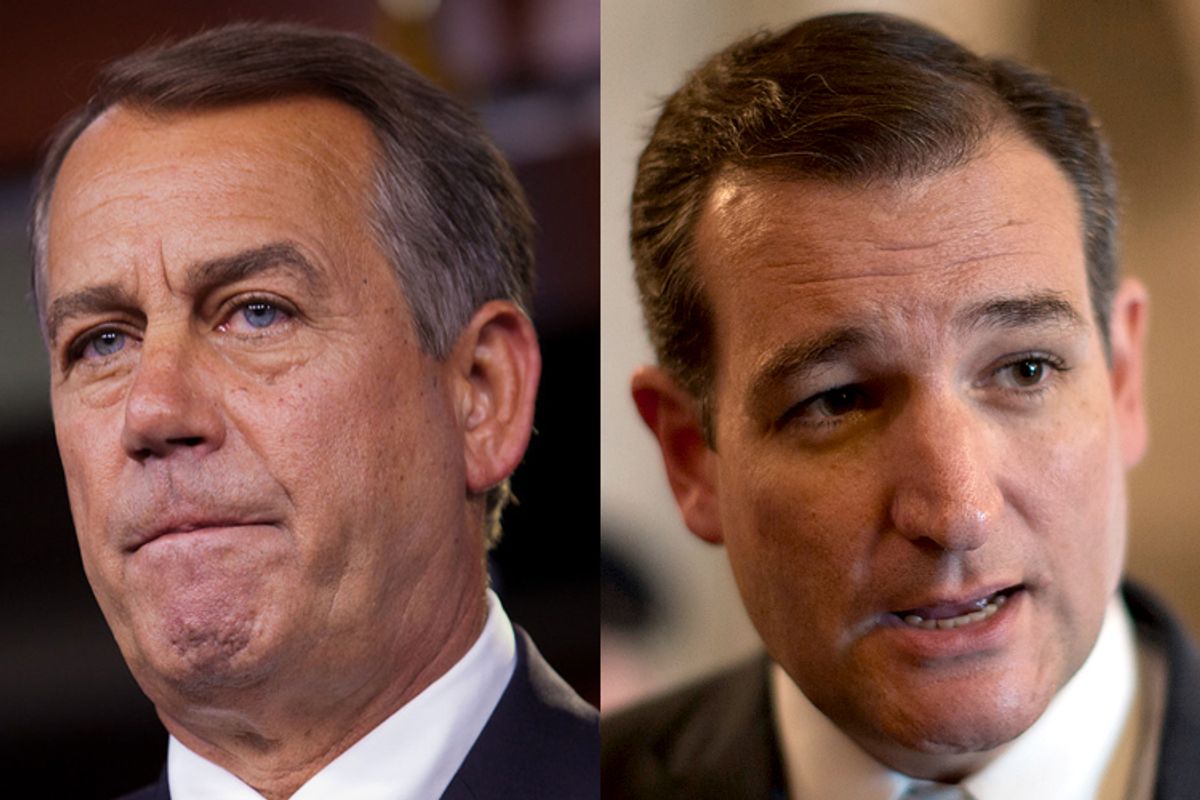In the brief window between the end of the government shutdown six weeks ago, and the news tsunami that drowned it out when the media realized how bad Healthcare.gov was, the conventional wisdom held that the GOP would resist the temptations of brinkmanship in the new year and extend funding for the government without any drama.
Part of the conventional wisdom was rooted in political math -- the shutdown was bad, there's no way they'd do it again, months closer to the midterms. Part of it was regression to the mean bias. Part of it was that Senate Minority Leader Mitch McConnell said so: “There’s no education in the second kick of a mule. The first kick of the mule was in 1995; the second one was the last 16 days. A government shutdown is off the table. We’re not going to do it … We’re not going to do this again in connection with the debt ceiling or with a government shutdown.”
Then as Affordable Care Act woes mounted, the conventional wisdom hardened. Republicans weren't going to surrender the gift of the Obama administration's blundering rollout of the Affordable Care Act by shutting down the government.
All reasonable inferences. And now, the offices of Rep. Paul Ryan, R-Wis., and Sen. Patty Murray, D-Wash., are baiting reporters with the possibility that the two chairs of the House and Senate Budget Committees will reach an agreement to pay down a few years of sequestration with a mix of other modest spending cuts and non-tax revenues spread out over many years. All that would be left to do then is pass some appropriations before Jan. 15 and we'd be in the clear.
With all that out there, if I had to wager now, I'd put my money on the conventional wisdom.
But I'd also want to find a safe hedge. And the reason, again, is the Affordable Care Act.
The relationship between the ACA rollout and the looming budget deadlines isn't quite as simple and static as it appeared in October.
Another shutdown would of course un-reverse the political reversal of fortune Republicans have enjoyed thanks to Obamacare, and that creates a huge incentive for Republican leaders to cut conservative hard-liners loose and strike a deal with Democrats on the budget. But a few things are pulling in the opposite direction.
One is just the natural inclination of parties to overreach when they believe they have the upper hand. Republicans have already wiped tax revenues off the table, and conservatives aren't exactly wild about raising revenue through fees and sales either, if it means using the proceeds to increase spending. They're nevertheless pressing Democrats to agree to Medicaid cuts -- something Democrats have been reluctant to do under any circumstances, but particularly if the tax side of the ledger tallies zero.
If Murray and Ryan manage to reach an agreement, conservatives groups -- Heritage, Club for Growth and others -- will very likely savage it, and if past is prologue, rank-and-file Republicans will follow, and GOP leaders will have to decide once again whether escalating a shutdown fight would be preferable to breaking the Hastert Rule.
If the deal falls through, Speaker John Boehner has posited that he'll place legislation to renew funding for the government at sequestration levels on the House floor, and finish out the fiscal year without a budget. But it's unclear if that bill could pass. House Republican military hawks are desperate to avoid this round of automatic cuts, because they primarily reduce defense spending. They'd have to be strong-armed into supporting a bill that allows those cuts to happen. Republicans might think battered Democrats would help them assemble a majority, but I believe they're mistaken.
"I'm not going to support a short-term CR [stopgap funding bill] that leads to a $967 [billion] … allocation," said Rep. Steny Hoyer, D-Md., who's the Dems' top vote counter.
The problem actually gets worse if Healthcare.gov continues to enroll tens of thousands of people a day. The next deadline for funding the government lands after benefits kick in, but before open enrollment ends. Conservative hard-liners might thus (finally) accept that they can't use budget deadlines to delay or defund the law, but they'll face a strong temptation to use this one to further discourage enrollment.
And how eager will conservatives be to play nice on the budget if the Obamacare worm has turned, and the incentive of keeping the rollout disaster on the front page no longer exists.



Shares